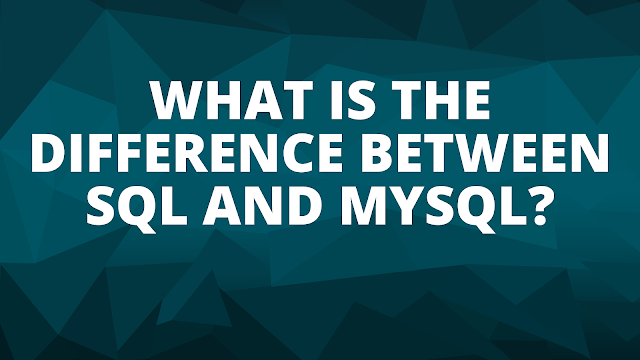In the realm of database management, the terms SQL and MySQL are often used interchangeably, leading to confusion for newcomers and even seasoned professionals. While they share a close relationship, SQL and MySQL are not synonymous. In this blog, we aim to shed light on the key differences between SQL and MySQL, clarifying their respective roles and functionalities in the world of database management.
SQL: The Language of Databases
Structured Query Language (SQL) is a standardized programming language used for managing relational databases. SQL serves as a universal language for interacting with various database management systems (DBMS) such as Oracle, SQL Server, PostgreSQL, and MySQL. It provides a set of commands and syntax for defining database structures, manipulating data, querying, and performing various administrative tasks.MySQL: A Popular Relational Database Management System
MySQL, on the other hand, is an open-source Relational Database Management System (RDBMS) that implements the SQL language. Developed by a Swedish company called MySQL AB, it gained immense popularity for its performance, scalability, and ease of use. MySQL adheres to the SQL standard and incorporates additional features to enhance functionality, making it a powerful and widely adopted choice for database management.Also Read: How to Become an SQL Developer: A Step-by-Step Guide
Key Differences:
Language vs. Database Management System:
SQL is a language—a standardized set of commands and syntax for working with databases. It serves as a common interface for interacting with different DBMSs. MySQL, on the other hand, is an actual database management system that implements the SQL language. It is a software application responsible for storing, managing, and retrieving data from databases.Portability and Compatibility:
SQL is a portable language that remains consistent across different database management systems. SQL statements written for one DBMS can generally be used with minor modifications in another. MySQL, while supporting the SQL standard, has its own specific features and extensions. Code written specifically for MySQL may not be fully compatible with other DBMSs.Licensing:
SQL itself is not a product or software; it is a language specification. It is available for use without any licensing restrictions. MySQL, being an open-source RDBMS, is also available under an open-source license. However, commercial versions and support services are provided by Oracle Corporation, which acquired MySQL AB.Features and Performance:
MySQL offers additional features beyond the SQL standard, such as stored procedures, triggers, and views. These advanced features provide developers with more flexibility and functionality. Performance-wise, MySQL is known for its speed and scalability, making it a popular choice for web applications and large-scale projects.
Conclusion:
Understanding the distinction between SQL and MySQL is essential for navigating the world of database management. While SQL serves as a universal language for working with databases, MySQL is a popular implementation of an RDBMS that incorporates the SQL language.Familiarity with these differences empowers professionals to make informed choices and leverage the right tools for their database needs. Aspiring data professionals should equip themselves with knowledge of both SQL and MySQL, as these skills are in high demand in the industry.
Additionally, preparing for sql interview questions will further enhance your expertise and increase your chances of success in job interviews. By mastering SQL and MySQL, you'll be well-equipped to tackle real-world database challenges and excel in your career.
